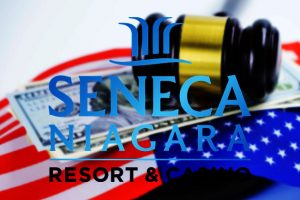 The Seneca Nation of Indians dispute with New York State could have devastating consequences to the three communities hosting a tribal casino venue. Niagara Falls officials announced that it is soon going to run out of cash if the tribe does not resume casino allocations.
The Seneca Nation of Indians dispute with New York State could have devastating consequences to the three communities hosting a tribal casino venue. Niagara Falls officials announced that it is soon going to run out of cash if the tribe does not resume casino allocations.
The US$12-million loan Niagara Falls bagged at the beginning of this fiscal year is projected to expire by the end of July. Hard times might lie ahead of Niagara Falls, as the city coffers might run dry in the upcoming weeks.
Niagara Falls City Councilman Kenny Tompkins recently made it clear that the touristic location enjoying the attention of millions of individuals on an annual basis could soon enter crisis mode, because of a significant budget hole gaping at the moment. He pointed out that it is only a matter of time before the city runs out of cash.
Casino Allocation Ceased in March 2017
 The main reason for this is the legal dispute between the Seneca Nation of Indians and New York State. Every casino host community receives a percentage of the gaming revenue generated at the casino venue. When it comes to the tribal casino venues overseen by the Native American tribe, this figure amounts to 25 percent of the gaming revenue generated.
The main reason for this is the legal dispute between the Seneca Nation of Indians and New York State. Every casino host community receives a percentage of the gaming revenue generated at the casino venue. When it comes to the tribal casino venues overseen by the Native American tribe, this figure amounts to 25 percent of the gaming revenue generated.
Up until this point, the city has been benefitting from the regular portions allocated to the city coffers. This provided a substantial boost to various initiatives and local projects aiming the ultimate improvement of the local community. Mr. Tompkins made it clear that there are thousands of individuals directly affected by the success of the local gaming field and the allocations resulting from Seneca Niagara Falls’ operation.
Both unionized employees and city workers are expected to feel the impact of such a turn of events. Ever since March 2017, the situation is critical for Niagara Falls, as the tribal casino operator claims it is not obliged to continue paying the 25 percent anymore. The first 14 years of its compact mandated this.
Gov. Cuomo Gives Niagara Falls US$12.3M
However, the tribal casino venue management claims that the last seven years of operation are not supposed to feature regular payments to the city coffers of neither Niagara Falls nor the remaining two communities hosting casino venues. Between 2002 and 2016, tribal casino operation managed by the Seneca Nation was able to boost host communities with an overall US$1 billion.
Seneca Buffalo Creek Casino and Seneca Allegany Resort and Casino continue operation to this day without paying anything to the state. Back in January, an arbitration panel issued its decision. University of New Mexico law professor Kevin Washburn as Seneca Nation’s arbitrator and Henry Gutman protecting the state’s interest were among its participants claiming that the tribe has to pay a total of US$255,877,747.44 and resume annual payments amounting to US$100 million a year.
Eyeing the potential of continued payments, the Seneca Nation of Indians recently filed a motion, seeking the Federal Court’s support in this dispute. The tribe wants to see the arbitration panel’s ruling eliminated, claiming that the panel does not have the authority to make compact amendments and mandate regular payments beyond the 14-year period that ended in 2016.
Experts projected that the tribe is going to take advantage of the Indian Gaming Regulatory Act. Meanwhile, Gov. Andrew Cuomo said that the state is going to allocate US$12.3 million to Niagara Falls but for the time being no deadline for the payment has been publicly issued.



















